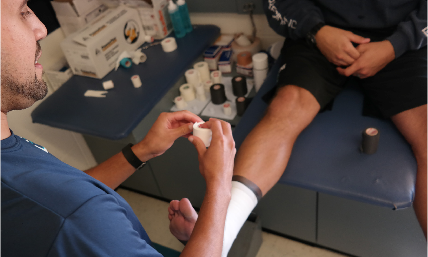
Harley Award winners, Triton Award recipients and hall of fame inductees have shaped the face of a proud Athletics program for six decades. From softball to soccer, baseball to tennis, sailing to volleyball, student-athletes have been recognized and rewarded. Banners of team successes line the walls of McArthur Gym, archaic shirts are framed to immortalize former players, whilst Coach Mathews represents the walking embodiment of an Eckerd sporting legend. From humble beginnings as Florida Presbyterian College to Sunshine State Conference inauguration, athletics has always been about the athletes.
However, the athletic big names on campus are the final piece of an intricately designed puzzle. They are the public arm of a department filled with employees who work under the radar. These esteemed, entrusted and selfless people go by the title of Physical Therapists, or Athletic Trainers if you prefer the more colloquial term. These faceless heroes and heroines act as the cornerstone of every varsity team. They are the adhesive that allows a frantic department to function, a key cog in a machine that often shuns their unquestionable importance.
The profession lures people with a burning desire for their work. It attracts those few who have an innate passion that is far more rewarding than financial compensation. Eckerd Athletics is fortunate to have acquired working staff that adhere to such principles.
Assistant Head Athletic Trainer German Hall, a highly respected professional, has a passion that derives from his playing days as an adolescent.
“I used to be an athlete in high school and college,” Hall said. “I suffered a lot of shoulder injuries and was a regular patient in the trainer’s room. I found it fascinating how the physical therapists got everybody back into their sport fit and healthy.”
Hall’s experiences act as a vital ingredient in the recipe of becoming a top athletic trainer. His experience as a collegiate athlete allows him to understand the psyche of the people he treats.
“[Athletic experience] made a big impact on my life and was a key reason why I got to where I did in college,” Hall said. “I knew from then on that if I didn’t make it professionally I would be able to stick around the athletic environment.”
Consequently, he has developed a strong rapport with the players he works alongside on a day-to-day basis.
“I love getting to work with a diverse group of athletes from all around the world, to learn about different cultures all under the umbrella of sports,” Hall said.
The athletic trainers have to deal with repugnant feet, corroded calluses, sprained ankles and torn tendons on a daily basis. They manage a catalogue of injuries and illnesses all in the name of their core ethos: player welfare.
According to Hall, an average working day is twelve hours, six times per week with the odd Sunday thrown in for good measure. If they are not patching up the latest hamstring tear or ultra-sounding weakened cartilage, they are swamped by a sea of paperwork. In a culture of ‘where there’s blame there’s a claim’, athletic trainers arm themselves to the hilt with bureaucracy. This career is not designed for the faint-hearted, nor for the personality deterred by an honest day’s work.
Perpetually looking for innovative ways to treat acute injuries, their thirst for medicinal improvement is second-to-none. Although they are gifted biological scholars, their road to becoming qualified athletic trainers is an arduous one. A bachelor’s degree is required, along with a minimum of three to five years worth of hands on experience. They have to possess an encyclopedic knowledge of NCAA and other governing body’s rules and regulations as well as possessing the business acumen of sticking to an inflexible annual budget. Individuals with a skill set of tremendous variety define the physical therapists at Eckerd College.
Richard Ainscough, captain of the men’s soccer team, spoke highly of the athletic training department’s caliber.
“The continuity of the athletic trainers is something that is special to this school,” Ainscough said. “You really get to develop relationships that go deeper than your average player-physio gets. The physiotherapists are a part of our family”.
Whether home and away or crack of dawn training sessions and lightning-delayed games, they remain a constant. Athletic trainers are akin to the stay at home mothers whose labor and sacrifice seldomly gets praised. But it’s not all doom and gloom — Eckerd has proud communal traditions, and athletics is no different. Each team acts as a family and the surrounding staffs are central to the daily dynamics of any collegiate sports team.
ORIGINAL ARTICLE:
http://theonlinecurrent.com/behind-the-scenes-spotlight-athletic-trainers/